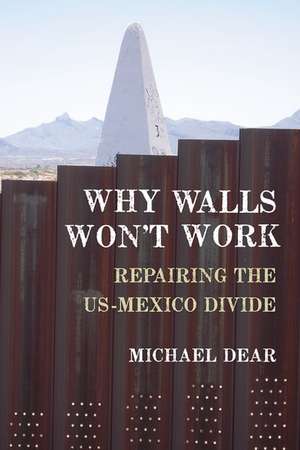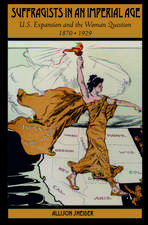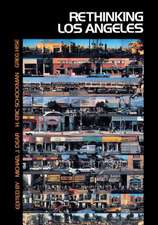Why Walls Won't Work: Repairing the US-Mexico Divide
Autor Michael Dearen Limba Engleză Paperback – 10 dec 2015
| Toate formatele și edițiile | Preț | Express |
|---|---|---|
| Paperback (1) | 223.52 lei 31-37 zile | |
| Oxford University Press – 10 dec 2015 | 223.52 lei 31-37 zile | |
| Hardback (1) | 294.47 lei 31-37 zile | |
| Oxford University Press – 7 mar 2013 | 294.47 lei 31-37 zile |
Preț: 223.52 lei
Preț vechi: 250.59 lei
-11% Nou
Puncte Express: 335
Preț estimativ în valută:
42.77€ • 44.77$ • 35.60£
42.77€ • 44.77$ • 35.60£
Carte tipărită la comandă
Livrare economică 19-25 martie
Preluare comenzi: 021 569.72.76
Specificații
ISBN-13: 9780190235253
ISBN-10: 019023525X
Pagini: 322
Ilustrații: 32 line drawings, maps, and photographs
Dimensiuni: 155 x 231 x 23 mm
Greutate: 0.45 kg
Editura: Oxford University Press
Colecția OUP USA
Locul publicării:New York, United States
ISBN-10: 019023525X
Pagini: 322
Ilustrații: 32 line drawings, maps, and photographs
Dimensiuni: 155 x 231 x 23 mm
Greutate: 0.45 kg
Editura: Oxford University Press
Colecția OUP USA
Locul publicării:New York, United States
Recenzii
A fascinating and indispensable book for everyone living in North America. Michael Dear deploys a rigorous social science mixed with the fresh eye of an explorer to guide us through the 'third nation' that has sprung up between Mexico and the US.
In this lucid, concise, engaging, graceful, and constructive volume, Michael Dear draws on insights from across the social sciences and humanities to map the emergence and significance of a 'third nation,' formed from the juxtaposition, interconnection, and exchange between Mexico and the United States on both sides of their increasingly blurred political border. Dear argues convincingly and eloquently that the physical barrier being constructed along the US-Mexico frontier is an unprecedented and damaging historical aberration that will eventually be overwhelmed by the strong, positive human connections between the United States and Mexico.
A comprehensive history of the multiple tensions and processes related to the creation and strengthening of the demarcation at the U.S.-Mexican border, based on a transnational and transdisciplinary perspective that recovers the multiplicity of visions and challenges on both sides of the border. The most novel aspect of Dear's approach is the complex and optimistic emphasis placed on the social and cultural practices of border people, which show connectivity, continuity, and the possibility of thinking about a region without walls. This is a challenge not only to the notion of border and nation, but also a powerful counterargument to the discourses of fear that permeate perceptions of one of the world's most sensitive geopolitical edges.
This is an important, elegantly written volume that reflects the very hybridity it seeks to portray: it flips between Mexican origins and U.S. politics, between cultural studies and hard social science, between the personal and the analytical with a playful skill and ease that captures the very spirit of the borderlands. Dear reveals the creation of a new border culture in which blended identities and daily transnational and transcultural interactions are emerging even as the walls between our two countries continue to rise.
Why Walls Won't Work is an excellent book that offers valuable insight into the forces that fracture the borderlands, or the third nation. Dear's contribution is important and a regional survey of the borderlands. His critiques of the Border Industrial Complex in the United States and the drug wars in Mexico are especially good.
In this lucid, concise, engaging, graceful, and constructive volume, Michael Dear draws on insights from across the social sciences and humanities to map the emergence and significance of a 'third nation,' formed from the juxtaposition, interconnection, and exchange between Mexico and the United States on both sides of their increasingly blurred political border. Dear argues convincingly and eloquently that the physical barrier being constructed along the US-Mexico frontier is an unprecedented and damaging historical aberration that will eventually be overwhelmed by the strong, positive human connections between the United States and Mexico.
A comprehensive history of the multiple tensions and processes related to the creation and strengthening of the demarcation at the U.S.-Mexican border, based on a transnational and transdisciplinary perspective that recovers the multiplicity of visions and challenges on both sides of the border. The most novel aspect of Dear's approach is the complex and optimistic emphasis placed on the social and cultural practices of border people, which show connectivity, continuity, and the possibility of thinking about a region without walls. This is a challenge not only to the notion of border and nation, but also a powerful counterargument to the discourses of fear that permeate perceptions of one of the world's most sensitive geopolitical edges.
This is an important, elegantly written volume that reflects the very hybridity it seeks to portray: it flips between Mexican origins and U.S. politics, between cultural studies and hard social science, between the personal and the analytical with a playful skill and ease that captures the very spirit of the borderlands. Dear reveals the creation of a new border culture in which blended identities and daily transnational and transcultural interactions are emerging even as the walls between our two countries continue to rise.
Why Walls Won't Work is an excellent book that offers valuable insight into the forces that fracture the borderlands, or the third nation. Dear's contribution is important and a regional survey of the borderlands. His critiques of the Border Industrial Complex in the United States and the drug wars in Mexico are especially good.
Notă biografică
Michael Dear is Professor of City and Regional Planning in the College of Environmental Design at the University of California-Berkeley. The author/editor of more than a dozen books, he has been a Guggenheim Fellowship holder, a Fellow at the Center for Advanced Study in the Behavioral Sciences at Stanford, and Fellow at the Rockefeller Center in Bellagio, Italy. He has received the highest honors for creativity in research from the Association of American Geographers, and numerous undergraduate teaching and graduate mentorship awards.






















